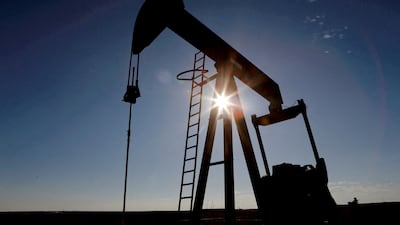Oil prices fell at the start of trading on Monday as traders weighed demand growth prospects, following China’s economic reopening, against broader global economic headwinds.
Brent, the benchmark for two thirds of the world’s oil, was trading 0.84 per cent lower at $84.56 a barrel at 10am UAE time, while West Texas Intermediate, the gauge that tracks US crude, was down 0.80 per cent to $79.22 a barrel.
Oil prices have eased after closing strong on Friday to mark the biggest weekly gain since October as inflation in the US cooled, sending the dollar to a seven-month low, and the outlook of growing demand from China, the world's biggest crude importer, improved.
Brent futures added 8.5 per cent while WTI rallied 8.3 per cent to recoup most of the losses from the previous week.
“Improving sentiment around China’s demand recovery, along with hope that central banks will be able to move to a slower pace of monetary tightening, will help oil prices in the near term,” Khatija Haque, chief economist at Emirates NBD, said in a research note on Monday.
Inflation in the US continued to slow in December, easing pressure on households and businesses.
The consumer price index increased by 6.5 per cent annually last month, from 7.1 per cent in November, the US Bureau of Labour Statistics said on Thursday.
It was the smallest 12-month gain since October 2021. On a monthly basis, the CPI decreased by 0.1 per cent in December.
Meanwhile, core CPI, which excludes food and energy, fell to 5.7 per cent annually, from 6 per cent in the previous month.
“The slowdown in US inflation helped to reinforce expectations that the Federal Reserve can move down a gear in tightening policy,” Ms Haque said.
China, the world’s second-largest economy, reopened its borders earlier this month as it almost reversed all border controls introduced to stem the spread of Covid-19.
The easing of restrictions by Beijing ended about three years of strict entry requirements that had hampered its economic growth.
On Monday, Emirates, the world's biggest long-haul airline, said it was ramping up its operations in China ahead of the New Lunar Year and in response to strong travel demand.
The Dubai airline will boost flights to Guangzhou, Shanghai and Beijing as the country reopens its borders and eases its coronavirus-related entry restrictions.
China’s crude imports are set to increase by 1.1 million barrels per day in 2023, compared with last year, with the country reopening and issuing new product export and crude import quotas, Energy Aspects said in a report earlier this week.
While prospects for the further oil market recovery remain bright in the sort terms, investors will look for clues for broader crude demand this week when Opec releases its monthly oil market outlook.
The International Energy Agency will also release its data, which is expected to underpin consumption trends.
Meanwhile, the US oil drilling rig count increased by five last week, taking the total to 623.
Oil companies would prefer having WTI prices closer to $90 a barrel before a “substantial increase in drilling”, the Emirates NBD note said, citing a survey from the Kansas City Federal Reserve.


